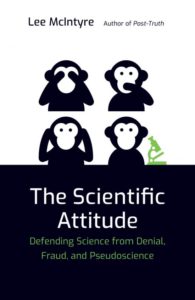“What is science?” Is a question that has held the attention of philosophers for quite some time. At least that is the contention of Lee McIntyre in his 2019 The Scientific Attitude: Defending Science from Denial, Fraud, and Pseudoscience. The author reviews many of the problems in the field including demarcation (how do we clearly differentiate scientific fields from those that are not science), scientific methods, and falsification. There are problems with all these that prevent getting to the root of science. Defining this important human endeavor appears to defy definition.
McIntyre’s solution to the problem of defining science changes the focus from looking at methods to looking at attitudes (hence the title of the book). Some may find this change to something more ineffable than what philosophers have sought to be less rigorous than previous attempts. For those of us who value science and evidence and the role both can take in human discourse (to answer scientific, technological, social, and political problems) this is a change that makes science and scientific thinking more approachable, thus it reflects an improvement in thinking about science.
McIntyre’s scientific attitude is captured in the introduction. “To do science, we must be willing to embrace a mindset that our prior beliefs, ideologies, and wishes do not matter in deciding what can pass the test for comparison to evidence” (p. 7). So, what does that mean for individuals, groups, and even societies that want to be scientific? McIntyre suggests we demonstrate the scientific attitude when we are willing to change our conclusions when evidence calls for it.
After proposing an attitude grounded in updating our beliefs (and actions) based on evidence to define scientific endeavors, McIntyre uses it to review fields in which it worked, such as the modernization of medicine and episodes of fraud in science, such as cold fusion and Wakefield’s retracted vaccine articles. In each case, McIntyre’s framework works to explain and understand the end results. When medical practitioners adopted the scientific attitude, health care improved. When “scientists” abandoned empirical evidence as the arbiter of reality, their careers were ruined, and misinformation arose that has had negative public health outcomes.
When we engage in science, we enter a necessarily subjective domain. Isn’t one’s attitude a personal decision, and can’t anyone then become scientific? McIntyre addresses that potential by considering deniers, conspiracy theorists, and pseudoscientists in terms of their attitudes towards their beliefs and the supporting (or refuting) evidence. In evaluating the attitudes of these non-scientific thinkers, the practices of the community of scientists and the idea of warrant (does the idea or evidence deserve serious consideration) are integrated into the definition as well.
A final characteristic of the scientific attitude (and one that in my opinion is given too little consideration) is the role of theory. Our theories affect the questions we ask and the observations we make, and the theories must provide explanations, when we eschew the scientific attitude, we accept different interpretations for supporting and refuting evidence. When we are bound by theory, such difference is not justified.
Data and evidence are important buzz words today. In my field of education, we have adopted these terms, but educators are woeful creators and consumers of evidence and data. In part, the difficulties my colleagues have when dealing with data is they do not understand how evidence should affect decisions. To be fair, many educators have grown up intellectually in non-scientific fields. The scientific attitude appears to give those who are unfamiliar with evidence and data with a much more approachable entry into assessing their use of data than traditional definitions. McIntyre does seem to have accomplished the goal implicit in the conclusion of his book that we can better understand and emulate science when we adopt this attitude.
